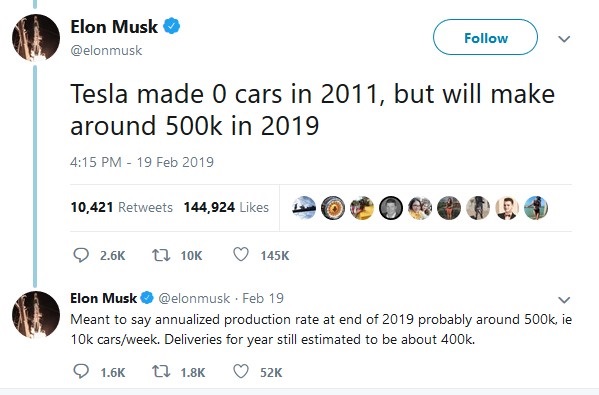
You won’t see a headline reading “Musk sets up the SEC.” But the Securities and Exchange Commission is in a pickle of its own making with no way out. Elon Musk, founder and Chief Executive Officer of Tesla, Inc., has been a persistent critic of short-sellers in the stock market, people who stand to profit if Tesla stock loses value. The SEC – intentionally or not – aided and abetted these stock market speculators at the expense of small shareholders when it brought action against Musk in 2018 for tweeting a claim that he had financing secured to take Tesla private and tried to bar him from participating in Tesla, Inc.’s management. Musk settled with the SEC on terms that left him in control of the company.
The SEC now claims that Musk’s recent tweet, reproduced above, violates this settlement agreement because he did not have Tesla’s official approval for the tweet, though he corrected it hours later in a tweet that did have company approval. (The SEC asserts the first statement was false because it said Tesla would produce 500,000 vehicles in 2019, instead of stating that Tesla would reach a production level in 2019 equivalent to 500,000 vehicles annually.)
Musk has set up the SEC. There is probably little risk that a federal court is going to bar him from managing Tesla, Inc. But there is a real risk that a federal court could rule that agreement violated the First Amendment. If that should occur, the SEC will have lost a fight they have long avoided – and a power many critics claim they have routinely abused.
The Securities and Exchange Commission does not make many headlines, apart from those in the Wall Street Journal and business periodicals. It is an artifact of the “New Deal,” created in 1934 by the Securities Exchange Act. The Act was designed to prevent securities fraud and, as part of that process, prohibit corporate insiders from trading on insider information. Tesla shares lost 12% of their value in the day after the SEC announced the 2018 action against Musk, the one person generally considered indispensable to Tesla achieving future success. The only beneficiaries were short-sellers – functionally, Tesla’s enemies and certainly not shareholders Congress was trying to protect in creating the Commission.

Seeking now to hold Mr. Musk in contempt for a statement that, at best, was slightly inaccurate and that he clarified hours later, the SEC is now to insisting on the right to gag corporate officers. The concept of “prior restraint” on speech is anathema to the First Amendment. Case law may allow the government to punish a statement. But it seldom allows the government to prohibit a person from making a statement. The order the SEC achieved in its earlier settlement with Musk does exactly that, and is Constitutionally vulnerable for that reason.
The Securities and Exchange Commission is already in a court battle over this issue. In January, the CATO Institute sued the SEC in federal court challenging the SEC’s practice of settling enforcement actions with agreements that prohibit the defendants in those actions from speaking publicly about the agreement or their conduct. Someone who settles with the SEC because he or she lacks the resources to continue the fight will be prohibited from making any statement in public that reveals what the SEC did, or why he settled despite his or her claim of innocence.
The CATO Institute wishes to publish a book by such an individual and makes two important points in its suit – both relevant to the SEC’s contempt action against Musk. First, of course, it argues that SEC gag agreement violates the First Amendment rights of the speaker. But, second – less obvious, but equally important – CATO argues that the gag order violates the public’s right to hear what the speaker has to say. Communication involves both speaking and hearing. The First Amendment is designed as much to protect the public’s right to hear opinions as it is to protect the individual’s right to express them.
The Securities and Exchange Commission has a lot to lose in the CATO lawsuit. That suit isn’t merely about publishing a book. It isn’t even simply about the ability of the SEC to impose gag orders as part of future agreements. At stake is the disclosure of every one of the secret agreements it has made in the past – agreements which, if the gag orders are Constitutional violations, are then subject to disclosure under the Freedom of Information Act. At risk for the SEC is the very real possibility that the agency’s conduct will receive a level of public disclosure that it has avoided for decades. Government agencies that make a fetish of hiding their actions usually do so for a reason.
The SEC’s attempt to hold Musk in contempt implicates the exact same Constitutional issues as the CATO lawsuit and does so in a factual setting that could hardly be worse for the SEC’s position. Musk has truly set up the SEC for a fight it has tried to avoid and probably cannot win,
Commentary has generally focused on the trivial nature of the supposed violation and the impact on Tesla, Inc. that results from distracting Musk from management while he defends himself. The exception has been Holman W.Jen kins, Jr., of the Wall Street Journal. In his March 2nd column, Jenkins correctly observed that Musk’s tweet was “almost diabolically innocuous” and that the SEC is now in a “miserable position,” either forced to back down with “another slap on the wrist” or attempting to ban Musk from Tesla, a move that will be “seen as pushing a company’s shares off a cliff while millions of investors still have faith in its glorious future.” If, however, the SEC attempts a “middle ground” of banning Musk from making online comments, Jenkins noted that the SEC risks a First Amendment fight that “could end up curtailing its sweeping and little-challenged powers over what [stock] market participants are allowed to hear and say.”
What Jenkins misses, however, is that the First Amendment issue is the first issue, should Must chose to raise it. No federal court has the power to hold a litigant in contempt for violating a court order that is itself unconstitutional. Musk is entitled to raise that issue as an absolute defense to the contempt action, not merely as a means to soften a possible penalty.
As it pursues its case, the Securities and Exchange Commission will again be allying itself with stock market speculators against the interests of Tesla’s many small shareholders. It will make itself into Goliath, while Musk will easily assume the role of David.
It may just lose, big time.
More and more, Elon Musk seems to be channeling Henry Ford – a topic visited in earlier posts that explored the parallels between Ford, the car and person, and Elon Musk and Tesla.
Musk has produced a automobile that the established industry did not even try to produce. In so doing, he has created a market that did not exist previously. He is using litigation to make himself into the champion of a cause, win or lose in court. Like Ford, he has created a public images that perfectly serves to promote himself and his company. And, of course, like Ford did with Model T, Musk is cutting the price of the Model 3 whenever he can. His recently announced decision to sell Tesla automobiles only online is as revolutionary to the automobile industry today as the assembly line was in Henry Ford’s day.
Like Henry Ford, Elon Musk knows exactly what he is doing. “Musk sets up the SEC” may not be in a headline, but it is the essence of the battle between Musk and the Securities and Exchange Commission. The SEC cannot afford to let Musk call their bluff.
For more about Tesla, visit our post Can Tesla Succeed?


